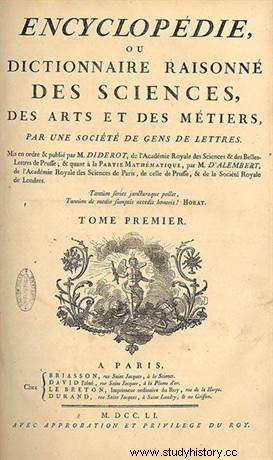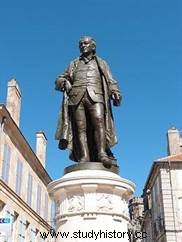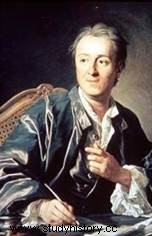 Diderot is not the best known of the great French minds of the 18th century, his name being most often only attached to L’Encyclopédie . Indeed, among the great thinkers and philosophers of the Age of Enlightenment, he is not necessarily the first name that comes to mind, at least compared to Voltaire or Jean Jacques Rousseau. However, this "universal head", as Rousseau rightly said to praise his eclecticism, left a fundamental work and thought, which have nothing to envy to his illustrious contemporaries.
Diderot is not the best known of the great French minds of the 18th century, his name being most often only attached to L’Encyclopédie . Indeed, among the great thinkers and philosophers of the Age of Enlightenment, he is not necessarily the first name that comes to mind, at least compared to Voltaire or Jean Jacques Rousseau. However, this "universal head", as Rousseau rightly said to praise his eclecticism, left a fundamental work and thought, which have nothing to envy to his illustrious contemporaries.
A young man looking for himself
Denis Diderot was born on October 5, 1713, in Langres (in Haute-Marne today), into a bourgeois family, a master cutler father and a mother daughter of a tanner merchant. Little is known of his childhood, except that he learned arithmetic at home and entered the Jesuit college at the age of ten. There he learned a classical education, made up of Latin and Roman literature. His family probably destined him for the priesthood, his brother would become a canon.
 Diderot left his hometown in 1728 or 1729, for Paris. Little is known about his life from that time until the early 1740s. He led a bohemian life, but nevertheless obtained the title of master of arts from the University of Paris in 1732. Chaining "odd jobs" (including a tutor), he also learned English and obtained his first literary income through translations (“History of Greece” by Temple Stanyan, 1742 and “Essay on Merit and Virtue” by Shaftesbury, 1745). However, he falls out with his family because of the path he has chosen and his desire to marry Nannette Champion.
Diderot left his hometown in 1728 or 1729, for Paris. Little is known about his life from that time until the early 1740s. He led a bohemian life, but nevertheless obtained the title of master of arts from the University of Paris in 1732. Chaining "odd jobs" (including a tutor), he also learned English and obtained his first literary income through translations (“History of Greece” by Temple Stanyan, 1742 and “Essay on Merit and Virtue” by Shaftesbury, 1745). However, he falls out with his family because of the path he has chosen and his desire to marry Nannette Champion.
In 1746, he published the Philosophical Thoughts which made him known while making him suspect. He then entered a period of intense literary activity, leading both the preparation of the Encyclopedia and the publication of numerous works borrowing from all genres:Les bijoux indiscrets (1747), The Letter on the Blind (1749), for which he spent several months in prison, the Thoughts on the interpretation of nature (1754), the Natural Son (1757) and the Father (1758).
This does not prevent him from remaining attached to Langres ("The head of a Langrois is on his shoulders like a church rooster at the top of the bell tower (1759)" ) and especially to keep a deep respect for his father; when he died in 1759, it was a shock for Diderot. The figure of this father probably marked part of his work, as the archetype of the virtuous man, as can be seen in the play "The father of the family" (1758).
Diderot and The Encyclopedia
The 1740s were decisive for Denis Diderot. In 1742, it was the first meeting with Rousseau, then the clandestine (and unhappy) marriage with Nannette Champion, and the break with the family. He then devotes himself ardently to work, publishes his first writings (mainly translations) and makes a name for himself through a few collaborations.
 It is through this that, from 1747, he tackled with others the editor (then director) of L'Encyclopédie , inspired by Chambers' "Cyclopedia". Commissioned from Diderot in 1745 by the bookseller Le Breton, this D iconary of sciences, arts and crafts has a subscription of five thousand members and the support of the Marquise de Pompadour. Montesquieu, Voltaire, Turgot will collaborate there... From this enormous and new work emerge the belief in the progress of science and the human spirit and the rejection of dogmatisms and taboos. The book provoked violent reactions from religious and conservative circles even before its publication.
It is through this that, from 1747, he tackled with others the editor (then director) of L'Encyclopédie , inspired by Chambers' "Cyclopedia". Commissioned from Diderot in 1745 by the bookseller Le Breton, this D iconary of sciences, arts and crafts has a subscription of five thousand members and the support of the Marquise de Pompadour. Montesquieu, Voltaire, Turgot will collaborate there... From this enormous and new work emerge the belief in the progress of science and the human spirit and the rejection of dogmatisms and taboos. The book provoked violent reactions from religious and conservative circles even before its publication.
His intense work on this literary and scientific monument guided and directed his life throughout the 1750s. His reputation became international, he was thus appointed in 1750 to the Royal Academy of Sciences et des Belles Lettres in Berlin and, in 1762, he was financially assisted by Catherine II of Russia in person. His work on The Encyclopedia This did not prevent him from publishing other writings, in particular philosophical ones, which caught the eye of the censor, which earned him a few weeks in jail in 1749, during which he was visited by Rousseau, with whom he collaborated.
On the private side, after the unhappy marriage, he had the happiness of seeing the birth of his daughter Marie-Angélique (1753), and of experiencing the passion with Sophie Volland.
After the Encyclopedia
The end of the writing of the Encyclopédie around 1765-1766 allowed Diderot to further diversify his work and his activities. He thus became an art critic for the Literary Correspondence of Grimm, which led him to write his famous Salons , and helped him publish his philosophical writings. For Catherine II, he became a dealer in works of art, before traveling to Saint Petersburg in 1773-1774.
The end of his life is more difficult, due to health problems and the death of several of his relatives, including Sophie Volland. However, he remains under the protection of Catherine II and Grimm. For the Empress, who bought his library from him, he was working on an education reform project.
Diderot died in 1784 and was buried in the Saint-Roch church. His archives were sent to Russia in 1786, but partly lost, which explains his lack of popularity compared to Voltaire or Rousseau. Likewise, his remains disappeared during the looting of the Saint-Roch church during the Revolution.
Diderot's work
 Besides Encyclopedia , it is immense and very varied:philosophical essays, plays, novels, reviews, etc. We can cite Le nephew de rameau , Jacques the fatalist and his master , Letter on the Blind for Those Who See and Additions ,
Besides Encyclopedia , it is immense and very varied:philosophical essays, plays, novels, reviews, etc. We can cite Le nephew de rameau , Jacques the fatalist and his master , Letter on the Blind for Those Who See and Additions ,
Diderot is also famous for his method, which sometimes overshadows his philosophical thought. He is very attached to the critical spirit, to personal reflection, and proves to be more of a thinker than a real philosopher, while being very attached to morality. In terms of religion, if he starts from a Catholic education (the Jesuits), he evolves during his life towards deism, theism, then materialism. However, he exalts nature as a "divine" and good force, and like many of his contemporaries applies himself more to the criticism of the excesses of religion than to religion as such.
Diderot is both the illustration of a new spirit, eager for knowledge, critical and impertinent, a promoter of the dissemination of knowledge, but also a novelist and a playwright of quality. Moreover, his philosophical essays make him, in some ways, a precursor of revolutionary ideas.
Bibliography
- R.Trousson, Diderot day after day:chronology, Champion, Paris, 2006.
- F. Marchal, La culture de Diderot , Champion, Paris, 1999.
- P. Quintili, Diderot's critical thinking:materialism, science and poetry in the age of the Encyclopedia (1742-1782), Champion, 2001.
- S. Chaveau, Les encyclopédistes, T2 Diderot the scruffy genius, Télémaque, 2010.
